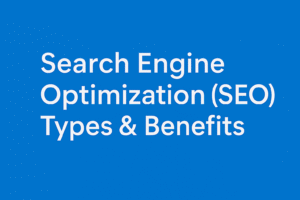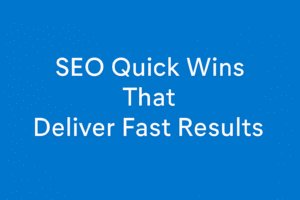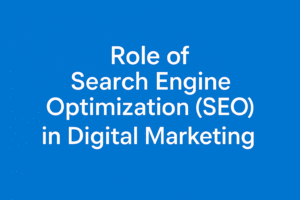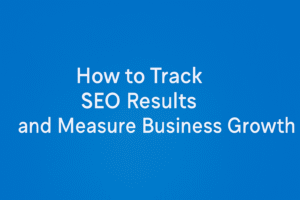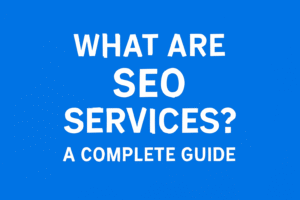Search engine optimization for business is the process of making a website easier for search engines to find and understand so it appears higher in search results. It combines content improvements, technical fixes, and strategic keyword targeting to connect with the right audience. In the context of search engine optimization in digital marketing, it is one of the most effective ways to attract customers who are actively searching for products or services.
Increased Visibility
When a business uses local search engine optimization to target relevant searches, it can appear in front of customers at the exact moment they are looking for solutions. This increased visibility builds recognition, keeps the business competitive, and increases the chances of being chosen over other options.
Higher Website Traffic
SEO for businesses is a reliable source of organic website visitors. By ranking for terms that match what customers are searching for, the business can attract steady traffic without relying solely on paid ads. These visitors are more engaged because they arrive with a specific need or interest in mind.
More Qualified Leads
Leads generated through seo services for businesses are often higher quality because they come from people who are actively researching or ready to purchase. By targeting the right search terms, businesses can focus on attracting customers who are more likely to take action.
Long-Term Marketing Asset
A strong long term seo strategy keeps working long after it is implemented. Unlike paid campaigns that stop producing results when the budget is gone, SEO can continue driving traffic, leads, and sales for months or even years. This makes it one of the most cost-effective marketing methods available.
Why SEO is Important for Your Small Business

Cost-Effective Marketing
Paid ads can deliver quick results, but the moment the budget stops, the traffic disappears. Search engine optimization for business takes more time to build, but once a site ranks well, it can generate consistent traffic without paying for every click. This makes it a cost-effective option compared to ongoing ad spend.
Building Brand Authority and Trust
When customers see a business appearing high in search results, they view it as more credible. Consistent rankings achieved through a strong seo strategy show that the business is established, relevant, and worth considering. Over time, this authority makes it easier to attract and retain customers.
Staying Ahead of the Competition
Competitors are likely investing in SEO to reach the same customers you want. Without a plan, they will capture the search traffic and the leads that come with it. Implementing local search engine optimization ensures your business appears in searches from nearby customers before they choose another option.
Improving User Experience
Search engines reward websites that are easy to navigate, fast to load, and mobile-friendly. Optimizing for these factors not only helps rankings but also makes visitors more likely to stay, explore, and con
tact the business. A well-designed seo website supports both visibility and user satisfaction.
How to Optimize Your Business for Search Engines
Optimizing your business for search engines means improving the visibility, usability, and authority of your website so it ranks higher in search results. A strong SEO strategy combines keyword research, on-page SEO, technical SEO, and off-page SEO. When these areas work together, they can increase website traffic, attract more qualified leads, and create long-term growth for your business.
Keyword Research
Keyword research is the process of finding and analyzing the terms your target audience uses to search online. It helps ensure your content reaches people who are looking for exactly what you offer.
Short-Tail Keywords
Short-tail keywords are broad, high-volume terms like “seo services” or “digital marketing.” They attract a large audience but face heavy competition, making them harder to rank for. They are valuable for building brand awareness over time.
Long-Tail Keywords
Long-tail keywords are longer, more specific search phrases such as “affordable local search engine optimization for small businesses in UAE.” They may bring in fewer searches but often lead to higher conversion rates because they match precise search intent.
Choosing the Right Keywords
The most effective approach is to use a mix of short-tail and long-tail keywords. Short-tail keywords can bring broad exposure, while long-tail keywords target ready-to-buy visitors. Selection should be based on search volume, competition, and relevance to your products or services.
On-Page SEO

On-page SEO focuses on the elements of your website that you can control directly. This includes optimizing content, structure, and design to appeal to both search engines and users.
Keyword Placement
Place important keywords naturally in titles, headings, introductory paragraphs, and throughout the page content. This helps search engines understand the page topic without making the text feel forced.
Meta Tags Optimization
Meta titles and descriptions appear in search results and influence whether people click your link. Each page should have a unique and accurate title tag and a compelling description that reflects its content.
Header Tag Optimization
Headings (H1, H2, H3) break content into clear sections, improving readability and signaling hierarchy to search engines. Descriptive, keyword-rich headings can enhance relevance.
URL Structure
Use short, descriptive URLs that include relevant keywords. A clear structure, like “/seo-website-development,” helps users understand what to expect on the page and makes it easier for search engines to categorize.
Internal Linking
Connect related pages within your site to help visitors discover more information and encourage them to stay longer. This also assists search engines in crawling your site efficiently.
Content Quality
High-quality content should be original, informative, and engaging. It should address the needs of your audience, answer their questions, and position your business as a trusted resource.
User Experience (UX)
A smooth, intuitive experience keeps visitors engaged. This includes fast load times, mobile-friendly design, and easy navigation that helps users find what they need quickly.
Technical SEO

Technical SEO focuses on the behind-the-scenes factors that affect how search engines crawl, index, and rank your site.
Site Speed Optimization
Slow websites frustrate users and can negatively affect rankings. Techniques like compressing images, reducing server response time, and minimizing code can help pages load faster.
Mobile-First Design
With most searches now happening on mobile devices, your website should be responsive and fully functional on all screen sizes. Google’s mobile-first indexing makes this a key ranking factor.
HTTPS
Securing your site with HTTPS protects visitor data and builds trust. Search engines prefer secure websites, and browsers may warn users if a site isn’t encrypted.
Robots.txt and XML Sitemap
The robots.txt file controls which pages search engines can access, while an XML sitemap lists important pages to ensure they are indexed quickly and accurately.
Schema Markup
Structured data helps search engines understand your content and can create enhanced listings in search results, such as star ratings or event details, which may boost clicks.
Canonical Tags
Canonical tags tell search engines which version of a page is the main one, preventing duplicate content issues and consolidating ranking signals.
Proper Indexing
Regularly monitor indexing to ensure important pages are included in search results and remove low-value or duplicate pages that could harm your site’s performance.
Off-Page SEO
Off-page SEO builds your website’s credibility and authority through activities that happen outside of your own site.
Link Building
Earning links from reputable, relevant websites signals trust and authority to search engines, which can improve rankings.
Outreach
Building relationships with bloggers, journalists, and industry publications can lead to mentions, backlinks, and increased exposure.
Brand Mentions
Mentions of your business name across the web, even without links, can improve brand awareness and influence search engine trust signals.
Influencer Outreach
Collaborating with influencers can expand your reach to new audiences, boost credibility, and generate content that supports your SEO goals.
White Hat Link Building
Ethical link-building practices that focus on quality over quantity are essential for long-term SEO success. These methods follow search engine guidelines and produce sustainable results.
SEO Best Practices
Applying SEO techniques without consistency or direction can lead to wasted effort. Best practices ensure that your strategy remains effective over the long term, adapts to search engine changes, and delivers sustainable results for your business.
Create Quality Content Consistently
Publishing fresh, relevant content on a regular basis keeps your website active in the eyes of search engines and gives visitors a reason to return. Focus on articles, guides, case studies, or product updates that provide real value to your target audience.
Optimize for User Intent
Search engines aim to deliver the most relevant results to a user’s query. Before creating content, understand the intent behind the keywords you target—whether users are looking for information, comparing options, or ready to make a purchase.
Keep Mobile Users in Mind
With the majority of searches now happening on mobile devices, mobile optimization is non-negotiable. Ensure your site design, navigation, and functionality work seamlessly on smartphones and tablets.
Monitor Performance Regularly
Use tools like Google Analytics and Google Search Console to track traffic, keyword rankings, and user behavior. This data reveals what’s working and where adjustments are needed.
Update and Refresh Old Content
Older content can lose visibility over time if it becomes outdated. Regularly review your existing pages, update information, improve formatting, and add relevant keywords where appropriate.
Build a Strong Link Profile
Earn backlinks from reputable, industry-relevant websites to strengthen your site’s authority. Focus on building relationships, producing share-worthy content, and maintaining a natural link growth pattern.
Follow Search Engine Guidelines
Avoid practices that violate search engine policies, such as keyword stuffing or buying links. White hat SEO methods ensure your rankings are sustainable and reduce the risk of penalties.
Stay Informed About Algorithm Updates
Search engines update their algorithms regularly. Keeping up with these changes allows you to adapt your SEO strategy quickly and maintain rankings.
Partner with Infinitra Web for Your SEO Success
Growing your business online requires more than just a website—it needs visibility, trust, and a steady flow of the right visitors. Search engine optimization is one of the most effective ways to achieve this, combining keyword targeting, on-page improvements, technical enhancements, and off-page strategies to deliver measurable growth.
Infinitra Web is a UAE-based digital marketing agency dedicated to helping businesses succeed online. We offer complete SEO solutions, including seo website development, local search engine optimization, technical audits, and content strategies tailored to your goals. Our approach blends proven techniques with a deep understanding of your industry, ensuring you get both quick wins and a sustainable long term SEO strategy.
If you want your business to rank higher, attract qualified leads, and stay ahead of the competition, let Infinitra Web be your SEO partner. Contact us today to start building a stronger online presence that works for you 24/7.


